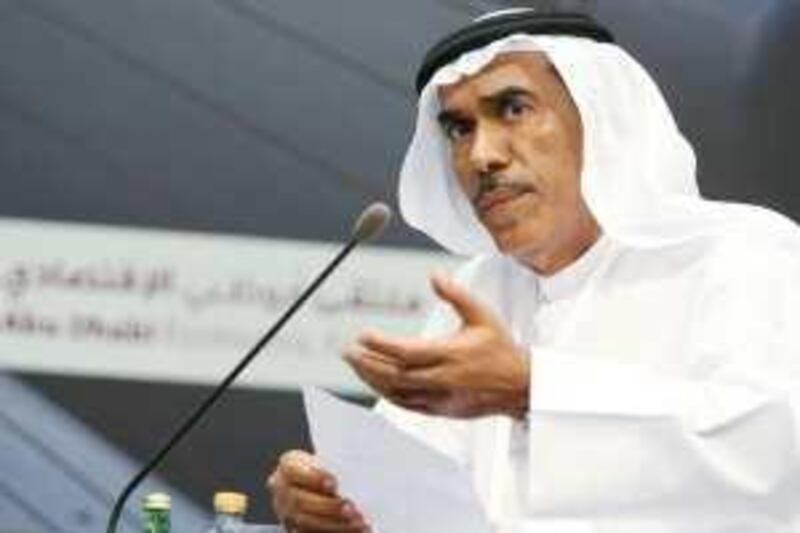The global slowdown could prompt adjustments in Abu Dhabi's economic plans for the next five years, but it will not cause any modification of the emirate's plan to diversify and expand its economy in the long run, a government official says. "The principles and priorities for the 2030 plan have not changed," said Mohammed Abdullah, the undersecretary of the Abu Dhabi Department of Planning and Economy, referring to the long-term blueprint for the emirate. "However, we are taking into consideration the economic challenges for the shorter, five-year plan." Mr Abdullah, speaking at the Abu Dhabi Economic Forum yesterday, said the Government's ability to boost spending on local infrastructure projects, along with its recent move to inject more funds into the emirate's banks, would be sufficient to see the local economy through the next year. The Minister of Economy, Sultan al Mansouri, speaking on the sidelines of the forum, agreed. "I don't think there will be recession in the UAE," he said, according to a Reuters report. "At present, we see stability for at least nine months." Unveiled two months ago, the emirate's ambitious 2030 plan lays out a series of industries to be developed as Abu Dhabi doubles its population and expands its economy well beyond revenues from oil. Mubarak al Muhairi, the director general of the Abu Dhabi Tourism Authority, said all local tourism-related developments already under construction would be finished, and the number of tourists to visit the emirate this year should not be lower than last year. Still, the global economic and financial crisis has crimped lending and left many businesses scrambling to retain cash and obtain money to expand. Representatives of private businesses said the Government needed to do more to help. "The Federal Government has provided liquidity to banks to help the private sector, but unfortunately the private sector still lacks a lot," said Abdullah al Mansouri, the chairman of Al Nasser Holdings, a construction, industrial and retail conglomerate based in Abu Dhabi. "We should speak bluntly and openly to the Government and tell it if we need support," he said. It was one of the few statements of the day that received a round of applause from the audience. In some cases, local banks had begun to renegotiate their contracts with borrowers in order to gain more favourable terms, Mr al Mansouri said. "Bank are negotiating on contracts that were signed about two years ago to benefit from the current situation caused by the financial and economic crisis. Of course, the private sector is bearing the cost." Salah al Shamsi, the chairman of the Abu Dhabi Chamber of Commerce, said although the Government had provided aid to the local banks, the measures had not eased a funding shortage for them. So far, the Government has pledged up to Dh120 billion (US$32.67bn) for local banks, Dh50bn of which has already been injected in the form of long-term deposits. "We need a comprehensive plan to cover all the sectors, not just the financial sector," Mr al Shamsi said. "When you provide financial support to banks, that will not be enough, and it will not benefit the different sectors. We should not just depend on the banks to give long-term loans." Ziad al Abbas, an official at the National Bank of Abu Dhabi, said although the emirate's banks were trying to provide local businesses with adequate funding, they have had to cut back on loans due to the perceived riskiness of certain sectors. "Banks cannot provide loans as before, because now we have some risky sectors," Mr al Abbas said. "Of course we cannot give loans as we have in the past, especially like in September of last year." Mr al Mansouri suggested that since the Government could not force the banks to lend to the private sector, it should create a new bank dedicated to this practice. "We need an industrial bank at the level of our emirate to develop the industrial sector," he said. * with Reuters tpantin@thenational.ae
Abu Dhabi may fine-tune 5-year plan
The global slowdown could prompt adjustments in the capital's plans but will not affect plans to expand the economy.

Editor's picks
More from the national




